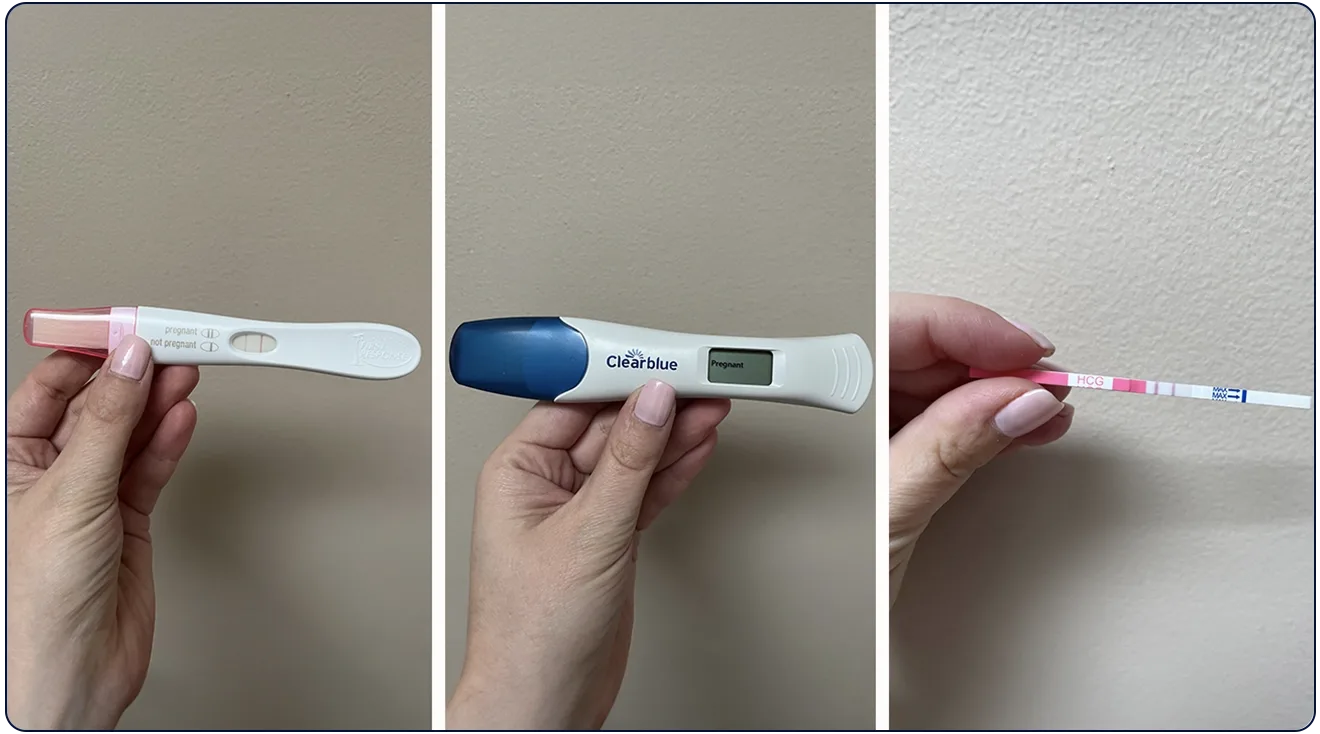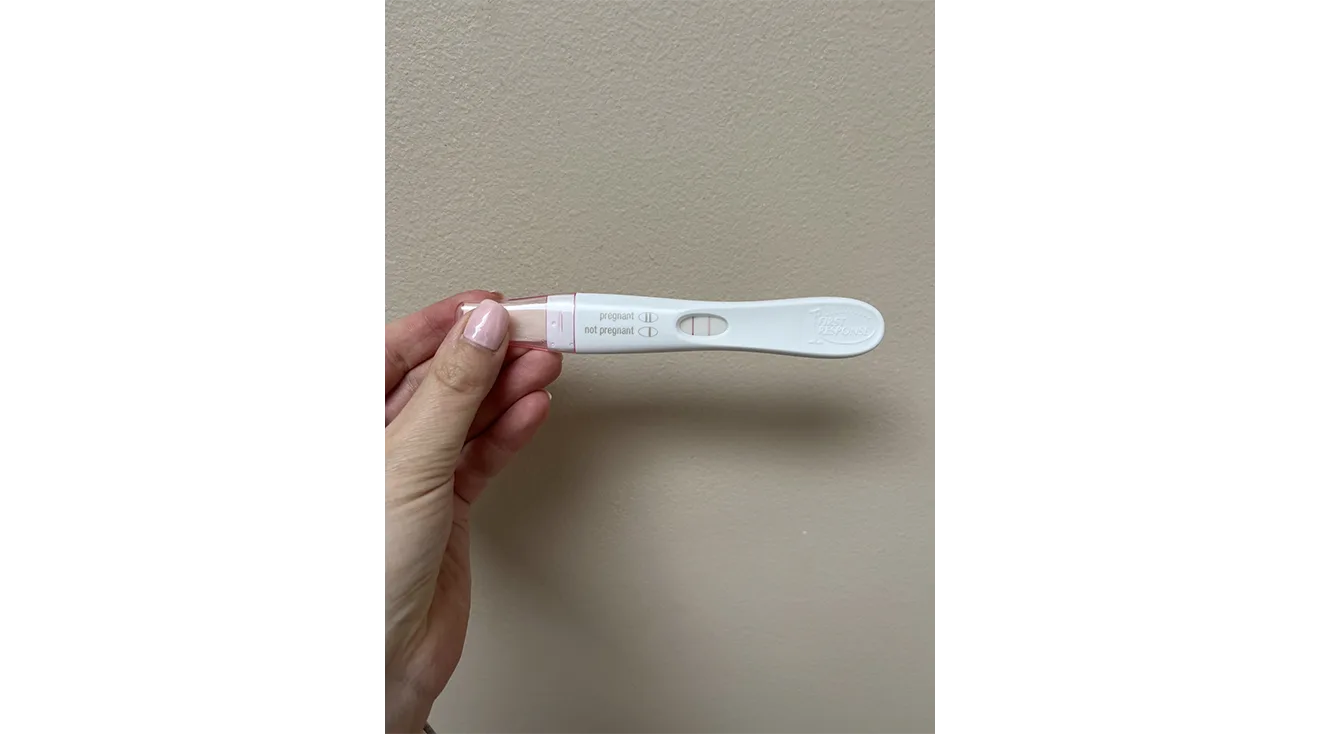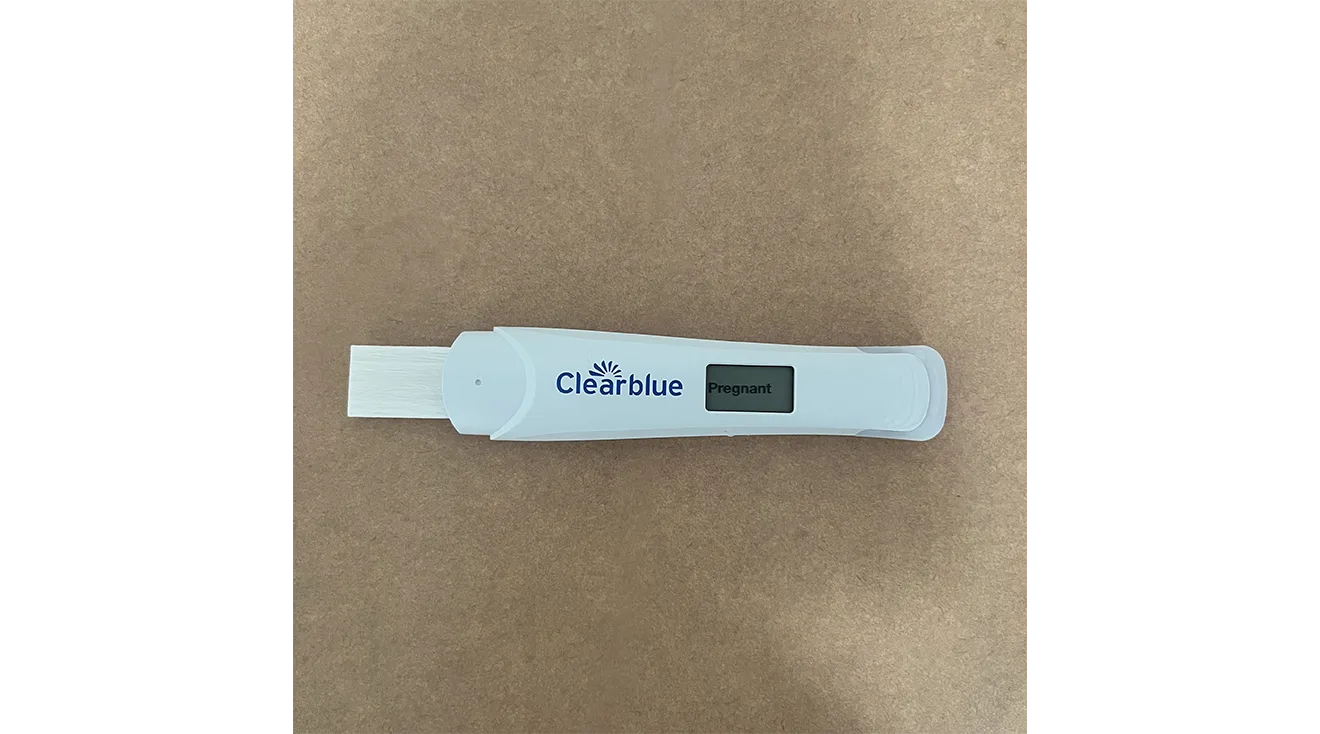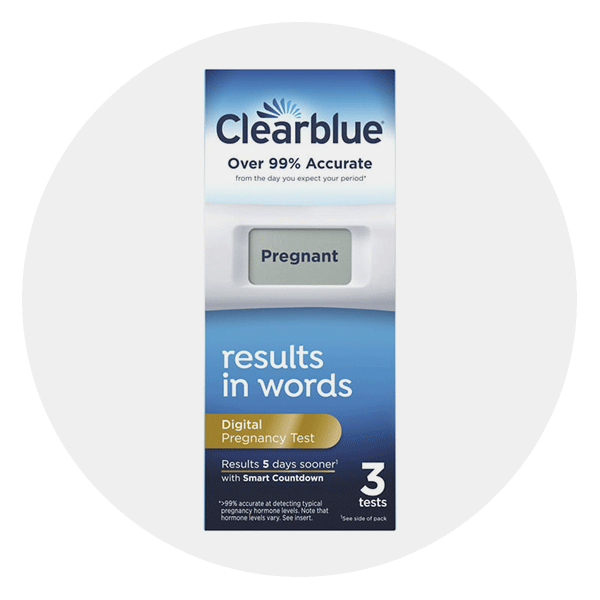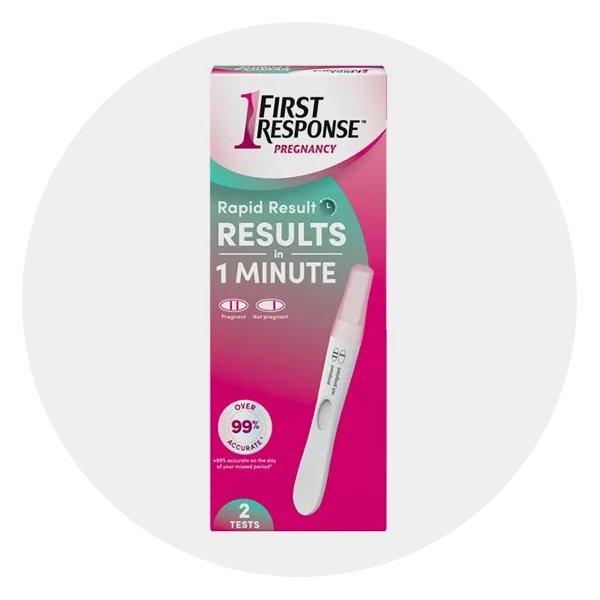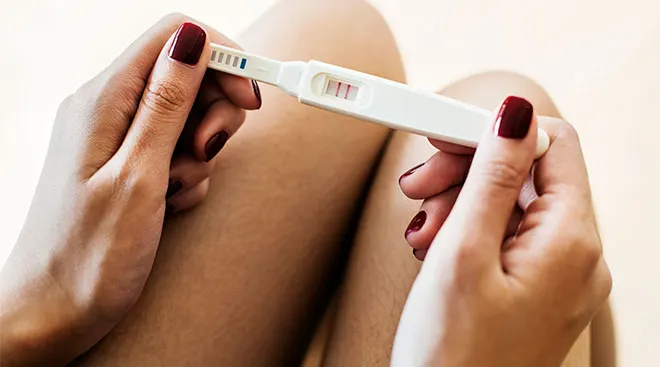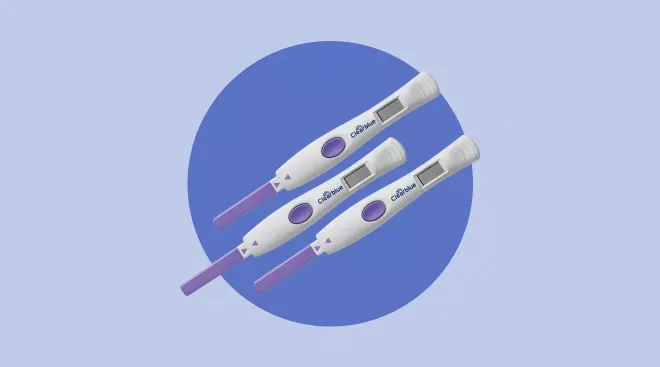6 Best Pregnancy Tests, Tested and Approved by Moms-to-Be
In a nutshell:
Based on feedback from our product testers, advice from ob-gyns and a survey of over 300 new and expectant parents from The Bump community, we chose First Response Early Result Pregnancy Test as the overall best pregnancy test on the market today. This home pregnancy test stood out because of its ease of use, sensitivity, clear instructions and quick results.
If you think you might be pregnant, there’s an easy way to know for sure: Take a home pregnancy test! You can go to a doctor’s office or hospital to have a urine or blood test done, but many women prefer to get the answer from the comfort of their home—or, more specifically, their bathroom. I’m currently pregnant with my first child, so I know picking a test is easier said than done. You want the most reliable pregnancy test on the market, and there are seemingly unlimited options, all of which make similar claims.
But not all pregnancy tests are created equal. “One might be positive and another negative on the same day in a woman who is newly pregnant, and the difference is the quality and sensitivity of the pregnancy test,” says Sara Twogood, MD, an ob-gyn at Cedars Sinai Medical Center in Los Angeles and author of Ladypartsblog.com. Whether you’re scouring the aisles of your local pharmacy or scrolling online, it’s difficult to know what’s the best home pregnancy test out there. My colleague Christine Carpenter and I have personally tested multiple pregnancy tests to bring you the scoop on the best options in various categories so you can choose what’s best for you, from the overall best pregnancy test to tests suitable for a host of personal needs. You’ll be “adding to cart” with confidence in no time.
The Bump editors conducted extensive research to identify 26 of the leading pregnancy tests on the market, and chose a shortlist of 15 standout products to test. From there:
-
My colleague and I personally tried 15 pregnancy tests. At 34 and 31 weeks pregnant, respectively, we know what to look for in an accurate reading and focused on factors that helped us on our journeys to conceive, rating each test on ease of use, clarity of results, speed, accuracy and value for money.
-
We interviewed four ob-gyns to understand essential features and health considerations you should keep in mind when shopping for and using pregnancy tests.
-
We surveyed over 300 new and expectant parents in The Bump community for additional insight into specific pregnancy test brands and products.
-
We leveraged our knowledge of leading pregnancy brands and reliable online retailers to source top-rated tests.
-
To see how these tests worked for a variety of families, we conducted exhaustive market research, scouring forums, message boards and user reviews to find out which home pregnancy tests expectant moms across the country loved and why.
Editorial integrity is at the heart of everything we publish. Read about how The Bump develops and reviews all articles, including product reviews.
Overall best pregnancy test
- Highly sensitive test
- Quick and clear results
- Detailed instructions, including result examples on the wand
- Just as with any non-digital test, evaporation lines can sometimes result in false positives
- Slightly more expensive than similar options
Let’s be honest, pregnancy testing can be stressful! You want a test that shows results quickly and clearly. You also want a test with user-friendly instructions that you can easily understand, even in an antsy state of mind (believe me, I know from experience!). Thankfully, the First Response Early Results Pregnancy Test comes with all that and more, earning it high praise from The Bump community—including Banafsheh Kashani, MD, an ob-gyn, reproductive endocrinologist and infertility specialist based in Laguna Hills, California, who recommends this test “because /[it’s] very sensitive in picking up low levels of human chorionic gonadotropin (hCG) and /[is] easy to use.”
In fact, First Response Early Results is one of the most sensitive pregnancy tests on the market; studies show that it can pick up hCG levels as low as 6.3 mlU/mL, while comparable products may require four times as much concentration. And as the name would imply, this test boasts the ability to detect pregnancy early on in your cycle: You can test up to five days before your expected period, which is as early as it gets with today’s home pregnancy tests.
Our other product tester, Christine, gave the First Response Early Results a 10 out of 10 in every category, including ease of use, clarity of results, speed of results, accuracy and value for money. The combination of high sensitivity, simple instructions and fast results not only solidified First Response Early Results as an easy favorite, but earned it a Best of The Bump award this year as overall best pregnancy test! (See all of this year’s Best of The Bump winners.)
How It Works
Remove the cap from the absorbent tip. Then, hold the end of the wand by the thumb grip. For five seconds, either position the tip below a urine stream or dip it in a cup of collected urine. Lay the test down on a flat surface and wait up to three minutes. Results will appear as a single line (not pregnant) or a double line (pregnant) in the testing window.
Ease of Use
Christine told us this test was “easy to use because of the printed instructions on the side of the box and also on the paperwork.” She also praised the way the “pregnant” double line and “not pregnant” single line (control line) were printed right on the stick beside the testing window, making it extremely clear how to read the results. While evaporation lines can sometimes cause confusion, Christine says that in her testing, First Response Early Results provided two clear lines fast, leaving little room for ambiguity. “The result initially yielded a faint line that intensified into a dark pink, very solid positive line.”
While it can take up to three minutes for results to come in, many users—including our product tester, Christine—reported seeing that second line appear much sooner. “While the instructions said to wait three minutes, the positive result came up for me within one minute,” she said.
Accuracy
Every pregnancy is different, and some women’s hCG may rise later in the cycle than others. But First Response Early Result Pregnancy Test is among the most sensitive tests on the market: As a result, this test can be used as early as five days before your expected period (or six days before your missed period). Better yet, this high sensitivity means you don’t have to use your first-morning urine to get accurate results (as is recommended for some tests).
Keep in mind that the accuracy improves the closer you are to an expected period. According to First Response, when testing five days before the expected period, pregnancy hormone levels were detected in 76 percent of pregnant women, and 96 percent of women four days before. Results are over 99 percent accurate by three days before the expected period. Our survey respondents agreed with this, rating this test highly for its accuracy. One mom told us she had accurate results six days after implantation.
Number of tests included: 2 | Type of result display: Single or double line | How early it can detect pregnancy: 5 days before expected period (76% accuracy)
Our product tester said:
“I would recommend this product. It provided quick results, it’s affordable and the results were clear and visible.”
Our Community Says:
Worked well with accurate results. – Julie*, expectant mom and The Bump survey respondent
Pregnancy tests are way too expensive in general, but the First Response ones were my preferred brand as I felt they were easy to use, accurate and easy to read the results. – Rachel*, expectant mom and The Bump survey respondent
Easy to use and was accurate! – Crystyl, expectant mom and The Bump survey respondent
Best pregnancy test for early testing
- Highest accuracy available five days before expected period
- Clear results displayed in words
- Quick results
- Wider absorbent tip and longer handle
- More expensive than similar options
To test or not to test? This is often a question that plagues prospective parents as they near their expected period date. The earlier you test, the less reliable the results are. But this test, our Best of The Bump winner for early testing, can be taken as early as five days before your expected period with a 78 percent accuracy rate, which is the highest accuracy rate you’ll find this far out among the products we tested. (Some tests tout six days before your missed period and others say five days before your expected period, but don’t be fooled—they’re one and the same! “Missed period” means the day after you expected your period, and “expected period” means the day your period should start.) I personally loved Clearblue Early Digital’s quick and clear results, which are much easier to read than the early detection lines of other tests, as well as its simple instructions.
How It Works
Remove the cap from the absorbent tip. Hold the test with the tip pointed downward. Either place the tip under your urine stream or dip it into a collected urine sample until a stop light begins to flash (this usually takes about five seconds). Place the cap back on the test and set it down on a clean, flat surface. The smart countdown timer will immediately appear on the display to show how the test is progressing, with dots increasing from one to four. Although the estimated wait time is one to five minutes, mine finished up in a little over a minute. The speed was nice! When the test is done, the words “pregnant” or “not pregnant” will appear on screen.
Ease of Use
I found this test very easy to use. Paper instructions came with the testing kit that included both step-by-step instructions and frequently asked questions. The Smart Countdown is a particularly nice feature, as it let me know the test was working. (If your bladder isn’t super full, other tests can leave you wondering if you managed to get enough urine.)
The test is designed with an extra-wide tip and the company’s patented floodguard technology, which is designed to prevent too much urine from entering the test—the leading cause of user testing error, according to Clearblue. If you do get an error message (as I did in my first attempt), make sure that the tip is kept downward during collection, and that the test is laid flat while waiting for results. Personally I preferred collecting a urine sample in a clean, dry container. Unfortunately, the testing kit does not include cups.
Accuracy
The test is highly accurate. According to Clearblue Digital’s instruction manual, the test is 78 percent accurate five days before your period—when you’re testing this early, there’s no test more accurate. If you wait an additional day, that accuracy rate goes up to 93 percent, and by the time you’re within two days of your expected period, the test is over 99 percent accurate.
Number of tests included: 2 | Type of result display: Digital LCD display | How early it can detect pregnancy: 5 days before expected period (78% accuracy)
“I used this product not only at 31 weeks as a product tester, but also early on in my pregnancy, about three days before my missed period. I got a positive result both times.”
Our community says:
I love and trust this brand. – Araceli, expectant mom and The Bump survey respondent
Easiest pregnancy test to use
- Easy to use with clear instructions that include photos
- Results clearly displayed in words
- Countdown feature lets you know when to expect results
- More expensive than comparable options
- Some users report results take longer than other tests
Behold, the pregnancy test for those who hate guesswork! The Clearblue Digital Pregnancy Test With Smart Countdown gives you an unmistakable result that actually spells out “pregnant” or “not pregnant.” There are no faint lines to decipher here, and nothing left to the imagination. But that’s not the only reason it was chosen as our Best of The Bump winner for easiest pregnancy test to use—the test’s smart countdown gives you peace of mind that it’s actually working, and for those who are impatient to see the results, it tells you how much longer you have to wait. As Christine put it, “there are no guessing games here.”
How It Works
If you’re using the Clearblue Digital with Smart Countdown pregnancy test on or after the day you expect your period, a urine sample from any time of day will work. If you’re testing early, Clearblue recommends using the first urine of the day for the most accurate results. Place the test’s absorbent tip either in a urine stream for five seconds or in a collected urine sample for 20 seconds and lay the stick flat while the countdown loads. Christine told us that the smart countdown display made it very clear that the test was progressing properly: The testing window shows flashing dots that appear in a sequence increasing from one to four, and when the sequence is done the results are ready. Results are expected to appear within three minutes but can appear as quickly as one minute, in which case the smart countdown will progress faster.
Ease of Use
The smart countdown was one of Christine’s favorite features of this pregnancy test. “It was comforting for me to know that not only was the test working but that I could monitor the progress in real time. No other brand on the market offers this option. And with the LCD display that literally spells out whether or not you’re pregnant, I felt completely confident in my positive results,” she said, adding, “When I was ready to begin testing after trying for our second baby, this was the test that made me realize it was really happening.” A positive result will show on the display screen for up to six months, making it easy to share your pregnancy news with family and friends. “Not pregnant” results show for approximately one day after testing.
Accuracy
Unlike Clearblue’s other offering in this list, the Early Digital, this test is designed to be taken slightly later in your cycle. The soonest it can be taken is four days before your expected period, at which point the test is 75 percent accurate. That said, waiting just one day boosts accuracy up to 95 percent. By the time you’re within a day of your expected period, results are over 99 percent accurate. While not designed for super early testing, Clearblue Digital remains highly accurate overall. Our survey respondents who used this test agreed, giving it top ratings for accuracy.
Number of tests included: 2 | Type of result display: Digital LCD display | How early it can detect pregnancy: 4 days before expected period (75% accuracy)
Our product tester says:
“It was very clear that the countdown was progressing with the dots increasing from one to four, once results were ready.”
Our community says:
This was so easy and clear to use. I didn't have any questions about the results. – Kristina, expectant mother and The Bump survey respondent
Very easy to use and clear results. – Sabrina, expectant mother and The Bump survey respondent
Best pregnancy test for fast results
- Fast results, sometimes within seconds
- High sensitivity test
- QR code to read results on your phone
- More expensive than comparable brands
- Indent lines may sometimes lead to false positives
As the name would imply, the First Response Rapid Result Pregnancy Test stands out for its speed. This test, our Best of The Bump winner for fast results, boasts a wait time of just one minute, but many women note that it often displays results even faster. In fact, Christine saw a second line on her test in just 10 seconds! So for those who’d prefer to avoid the anxiety of wait times, First Response Rapid Result is a great choice. As Christine put it, “First Response Rapid Result should change its name to Lightning Fast Result.”
How It Works
The instructions are clearly printed on the side of the box and in a detailed pamphlet inside. Holding the testing stick by the thumb grip with the result window facing away from the body, hold the tip in a five-second urine stream. Alternatively, dip the entire absorbent tip into a collected urine sample for 20 seconds. After 60 seconds or less, the results will appear as either a single line (not pregnant) or a double line (pregnant) in the testing window.
Ease of Use
Even though the indicated result wait time is one minute, Christine’s results appeared in the blink of an eye. According to the brand, that’s thanks to their enhanced technology, which both detects and isolates hCG in urine. In addition to the fast results, one of Christine’s favorite features of the First Response Rapid Result is the EasyRead app. “While my testing line was very easy to read,” she told us, “I can remember testing in the early days of my first pregnancy, holding tests up to the light to determine if there was a faint positive testing line or if I was imagining things! After downloading the app with a handy QR code on the side of the product box, you can use your phone’s camera to convert your testing results window into the words ‘pregnant’ or ‘not pregnant’ on your screen.” She absolutely loved the fact that First Response uses your phone to produce digital test results without the digital test price point!
Accuracy
According to First Response, the Rapid Result pregnancy test is over 99 percent accurate from the day of your missed period. It detects hCG in 76 percent of pregnant women five days before their expected period, 96 percent of pregnant women four days before, and more than 99 percent of pregnant women three or fewer days before their expected period. What’s more, our survey respondents agreed that this was one of the most accurate pregnancy test options out there, giving it high marks for accuracy.
Number of tests included: 2 Type of result display: Single or double line | How early it can detect pregnancy: 5 days before expected period (76% accuracy)
Our product tester says:
“This test promises one-minute results and results were shown within 10 seconds. Even though the line continued to darken, the positive result showed up very quickly and accurately.”
Best pregnancy test for frequent testing
- Low price for a lot of tests
- Results show up fast, often more quickly than the company promises
- Premom app can help interpret test results
- Less sensitive than some other brands
- Not the best choice for early pregnancy detection
After scouring online forums, it’s clear that Easy@Home’s popularity has skyrocketed in recent years, especially among those who are trying to conceive and prefer to test often. And after personally testing this product, it’s clear to me why. You get 20 tests per box for $13, which, when stacked up against other strips on the market, is among the higher number of tests for a pretty low price. While you could get more for less, our testing revealed they’re not as easy to use as Easy@Home—and if you plan on taking a pregnancy test often, you’re going want something that’s a breeze to take. The combination of easy testing and value for money made this test a shoo-in to win our Best of The Bump award for frequent testing.
This pick comes with detailed instructions, clearly labeled max lines and a QR code to an app that can interpret results early on in your cycle when that second line might be a bit hard to read. I used Easy@Home both early on in my pregnancy and again as a product tester at 31 weeks. Both times, I found the tests were accurate, yielded fast results and, most importantly, were user-friendly!
How It Works
Collect a urine sample in a clean, dry container. Dip your testing strip into the urine up to the cut-off line marked on the strip. Wait for the dye on the testing window to rise. This typically takes between 5 and 10 seconds. Remove the strip and lay it on a flat surface. Results should show up in five minutes or less, displaying either one line (not pregnant) or two lines (pregnant).
Ease of Use
I found these tests very simple to use both early on in my pregnancy and as a tester. I love that the test strips are clearly marked to show how far to safely dip them. With other brands, I’ve found it’s easy to over-dip, causing an error. Results also show up fairly quickly—depending on where you are in pregnancy, you might be able to see a faint second line within a minute or two.
You also get access to a QR code that takes you to the Premom app. This allows you to photograph your test strips and get a conclusive “positive” or “negative” reading, which can be hugely helpful if you’re nervous about faint or evaporation lines. When I first took Easy@Home tests before my missed period, the second line was a bit hard to see, so the app definitely helped me interpret this as a positive result.
Accuracy
Easy@Home’s accuracy is comparable to other tests on this list, able to detect hCG levels of 25 mlU/mL with over 99 percent accuracy. Speaking from personal experience, I got positives both early in my pregnancy and later on. However, this level of sensitivity doesn’t lend itself to super early testing; in my experience the early lines were often more difficult to detect. For the clearest results, it's best to use this product within a day of your expected period.
Number of tests included: 20 | Type of result display: Single or double line | How early it can detect pregnancy: 1 day before expected period (99% accuracy)
Our product tester says:
“The test came with easy, straightforward instructions. The strips were also clearly labeled so you can tell how far to dip them.”
Our community says:
Great value for the price! – Veronica*, expectant mom and The Bump survey respondent
Best budget-friendly pregnancy test
- Great value
- Simple to use, with comprehensive instructions
- Includes urine collection cup
- Fast, accurate results that show up in seconds
- Not the best choice for early pregnancy detection
- Faint results can be hard to interpret
If you’re a budget-conscious parent-to-be, you’re going to want to grab a box of MomMed Pregnancy Test Strips, our Best of The Bump winner for best budget-friendly pregnancy test. Not only are they way cheaper than wand-style pregnancy tests (which can cost upwards of $5 a pop), but they’re easily the most affordable pregnancy test strips we shortlisted for testing, clocking in as low as 30 cents a test! (Other strips cost as low as 40 cents each and went as high as $1.40.) That means you can test multiple times in one cycle and have tests on hand for subsequent cycles without breaking the bank. Not only that, but these MomMed strips scored a perfect 10 out of 10 in our testing, proving that cheap pregnancy tests don’t have to be unreliable or inconvenient. In fact, I found myself sorely wishing I’d heard of the brand back when I was trying to conceive—I definitely would have bought a pack or two!
How It Works
Collect urine in the cup included with your MomMed tests. Place the test strip into the urine up to the cut-off line. After five seconds, remove the strip. Place the strip on a clean, flat surface. Within five minutes, results should appear as either one line (not pregnant) or two lines (pregnant).
Ease of Use
One of my favorite things about MomMed is that it includes a urine cup. This makes my life infinitely easier as I don’t always have disposable cups on hand for urine collection. It also comes with a clear instructions pamphlet, and the test strips themselves are labeled, showing users how far to dip them. My results appeared in just seconds with two clear lines.
Accuracy
According to MomMed’s website, these tests are over 99 percent accurate. While they can be taken up to five days before your missed period, the brand specifies that it’s best to wait until after your expected period for most accurate results. The clarity of test results often depends on hCG levels and when in pregnancy you’re testing, but I did come across some users who said they got very faint, unclear lines during early testing.
Number of tests included: 20 | Type of result display: Single or double line | How early it can detect pregnancy: 4 days before expected period (99% accuracy)
“It's a great value for the number of tests you get, and the test results came through more or less right away. I also hugely appreciate them including a cup for urine collection”
*Note: Some names have been changed due to privacy requests.
The serum pregnancy test (aka blood test) you might take at the doctor’s office is a super-sensitive method of measuring hCG, the pregnancy hormone. HCG “can detect a pregnancy at its earliest stages,” says Christian Pope, DO, an ob-gyn at St. Luke’s Hospital in New Bedford, Massachusetts. Home pregnancy tests look for that same hormone but in your urine, where it may take a bit more time for it to accumulate.
A blood test can detect pregnancy about six to eight days after conception, whereas a home pregnancy test generally works as early as 14 days after conception. (Some early-results pregnancy tests can offer results roughly eight days after conception, but the longer you wait, the more accurate the test is.)
But while you might have to wait a few days longer to take the test, you won’t have to wait long for the results: Home pregnancy tests can tell you whether or not you’re pregnant within a matter of minutes (or less!).
Home pregnancy tests all search for hCG in your urine, but there are various styles available that are used in slightly different ways.
Dye pregnancy tests come in the form of strips or wands; some you pee directly onto, while others are dipped into your collected pee. If hCG is detected in your urine, it’ll start a chemical reaction that makes a positive result line appear.
Digital tests, on the other hand, typically display words like “pregnant” or “not pregnant.” Many women find that these high-tech options are more user-friendly, and while they may cost more, they eliminate the possibility of misinterpretation.
So you’ve decided it’s time to take a home pregnancy test. Maybe you’re calm, collected and just need to know if you are or aren’t pregnant—or maybe you’re feeling a little anxious and eager to get accurate results as quickly as possible. Before you purchase a home pregnancy test, there are a few factors to consider.
The needs of every pregnant person vary, and what you look for might not be the same as someone else. When I first started trying to conceive, it was very important to me to find the most accurate pregnancy test I could. But I also wanted to be able to test often. I ordered both cheap test strips and more expensive digital tests. The best option for you boils down to individual needs. Are you prioritizing early detection or regular testing? Or perhaps ease of use and clarity of results? Once you’ve decided on these preferences, it’ll be easier to choose which type of pregnancy test is right for you.
If you’ve been trying to conceive, you’re probably anxious to take a test—and stat. But you’ll want to plan your fateful potty trip wisely. Home pregnancy tests are “most accurate when you take them after you have already missed your period,” explains Jane Frederick, MD, a reproductive endocrinologist and medical director of HRC Fertility in Orange County, California.
Early-result pregnancy tests are designed to detect the hormone as early as five days before your expected period. Still, the odds of getting a false reading narrow as you approach the date of your period. You should also try to take your home pregnancy test when you wake up, as “first morning urine…is most concentrated,” meaning a test is more likely to detect hCG levels, explains Pope.
Home pregnancy tests involve peeing on a stick or dipping a strip into a cup of urine. Follow the directions, and within a matter of minutes (or, in some cases, seconds!) you’ll have your result. It’s that simple.
Common mistakes to avoid when taking a home pregnancy test
Home pregnancy tests are fairly intuitive and pretty accurate. However, user error is possible—and there are some common mistakes you should try to avoid making. “Always check the package for expiration dates to maintain the accuracy of the test,” advises Frederick. Pregnancy tests have a shelf life, and using an expired one can result in a false positive reading.
Also, be sure to read the specific directions for the test you’re taking and follow the steps accordingly. Most importantly, check the result within the advised time frame. Wait too long, and you could detect an evaporation line. This is “a line that appears in the results window of a pregnancy test as the urine dries,” explains Frederick. In other words, it makes a test look positive when it’s actually negative.
How to read a pregnancy test
When taking a blue or pink dye pregnancy test, a control line will always appear to indicate that the test is working. The test line will deliver your results: If a second line or a plus symbol (it depends on the brand) appears within the instructed time frame, there is hCG in your system, meaning you’re pregnant! Consider setting a timer so you don’t wait too long to check the result and risk seeing the appearance of an evaporation line.
A positive result can bring on a surge of excitement; it can also come with its fair share of anxiety. If you want to take a second test for reassurance, go for it—just don’t feel compelled to buy out the pharmacy’s entire stock. “If one test is positive, the rest will be too,” says Pope. At this point, it’s time to schedule a prenatal appointment with your doctor and follow up for next steps.
Of course, a negative result can be devastating, but you shouldn’t feel defeated. If you’re testing early, follow up and test again after your missed period. If it’s been a few cycles and you’ve yet to get a positive pregnancy test, contact your doctor to discuss next steps; there are options.
Frequently Asked Questions
How accurate are home pregnancy tests?
Home pregnancy tests are generally considered very accurate (most are about 99 percent accurate on the day of a missed period)—so if you get a positive result, give yourself permission to celebrate.
Still, it’s important to note that, while very rare, false positives are possible. “[False positives] could occur if you had a pregnancy loss soon after the fertilized egg attached to the uterine lining, and if you took a pregnancy test soon after taking fertility medicine,” Kashani explains, since certain fertility drugs contain hCG and can result in a positive reading when you’re not actually pregnant. An expired test can also lead to a faulty reading.
False negatives can happen too. Most commonly, this would be the result of testing too early, as the “hCG hasn’t yet developed to a level where it can be detected in the urine,” says Kashani. Testing too early after ovulation or expected implantation, checking the results before the recommended wait time is up and testing at a time of day when your urine isn’t very concentrated are other reasons this may occur, according to Kashani.
Remember that pregnancy tests may have slightly different sensitivity levels. Still, home pregnancy tests purchased at stores and pharmacies are regulated by the FDA, so suffice to say, most are considered very reliable.
Do pregnancy tests expire?
Pregnancy tests are printed with an expiration date for a reason: They don’t last forever! Like other consumer goods, their effectiveness wears off over time. “Pregnancy tests generally have a shelf life of one to three years,” states Kashani. You should be able to find the date on the carton and on the individual packaging for each test.
According to Clearblue, the reason they expire is due to the antibodies home pregnancy tests use to detect hCG. When you use a home pregnancy test, antibodies in the test bind the hCG and produce a color change, visible to you as the lines on your results (or in the case of a digital test, visible to an optical sensor). Over time, those antibodies become less effective. Always check the date, since expired pregnancy tests can yield a false positive or a false negative result.
When is the best time of day to take a pregnancy test?
“The best time to take a pregnancy test is usually in the morning when the urine is most concentrated,” says Kashani. She explains that this is because most people have held their urine for about six hours overnight, allowing hCG to accumulate.
Why might I feel pregnant, even though my test results are negative?
If you find yourself in this scenario, make sure that you’re not testing too early or using an expired test—also, double-check that you’re using the test correctly. If you’re testing properly and still getting a negative result, you may just be experiencing PMS symptoms that mimic pregnancy, says Kashani. “This is usually related to the hormone progesterone, which rises after ovulation,” she explains. “If you are undergoing fertility treatments, it’s important to remember that fertility drugs are designed to adjust your hormone levels and can cause symptoms similar to PMS and pregnancy.”

About the writer:
Erin Wisti is a writer and journalist currently living in Los Angeles. Her work has appeared in Fourth Genre, Slate, Electric Literature, Lithub, and other places. She’s written on everything from baby clothes and pediatric safe sleep practices to cloud computing, and became well-versed in pregnancy tests when she became pregnant with her first child, born in June of 2024.
Interested in becoming a product tester for The Bump? Head here to apply.
Please note: The Bump and the materials and information it contains are not intended to, and do not constitute, medical or other health advice or diagnosis and should not be used as such. You should always consult with a qualified physician or health professional about your specific circumstances.
Plus, more from The Bump:
Sara Twogood, MD, FACOG, is an ob-gyn at Cedars Sinai Medical Center in Los Angeles and author of Ladypartsblog.com. She received her medical degree at Albany Medical College in Albany, New York.
Banafsheh Kashani, MD, FACOG, is a board-certified ob-gyn, reproductive endocrinologist and infertility specialist based in Laguna Hills, California. She received her medical degree at the University of South Alabama, College of Medicine.
Christian Pope, DO, FACOG, is an ob-gyn at St. Luke’s Hospital in New Bedford, Massachusetts. He received his medical degree at the Philadelphia College of Osteopathic Medicine.
Jane Frederick, MD, is an ob-gyn and reproductive endocrinologist. She serves as the medical director of HRC Fertility in Orange County, California. She earned her medical degree at the University of Southern California in Los Angeles, California.
Journal of the American Pharmacists Association, Sensitivity of over-the-counter pregnancy tests: comparison of utility and marketing messages, Sep-Oct 2005
Clearblue, Do Pregnancy Tests Expire?
The Bump May 2023 Survey. Editors conducted a survey of 300 new and expectant parents from among The Bump community, and asked what type and brand of pregnancy test they used.
Navigate forward to interact with the calendar and select a date. Press the question mark key to get the keyboard shortcuts for changing dates.

































